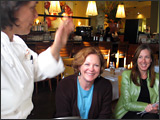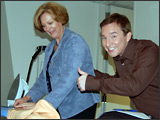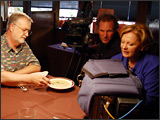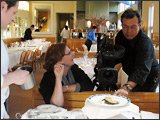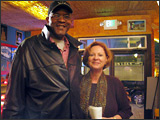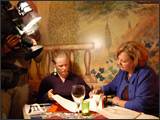Q: What exactly is your background in food?
A: Way back, before I even want to think about, I went to Cordon Bleu in London and I've worked in France, in England, and here, but all as cooks. I don't consider myself a chef, I call myself a cook.
Q: What's the distinction in your mind?
A: Chefs have gone through an apprenticeship and had proper training in a restaurant, where they work their way up through a restaurant. I've worked in restaurants but I haven't worked my way all the way through -- [I've done] mostly pastry. But in my other work, I've done all sorts of things. Such as, I've worked in a deli, which was one of my favorite jobs. I did director's lunches in a large company in London -- [for a big] insurance company -- and then I worked in France for awhile. I worked on a hotel barge in France for a summer, which was fantastic.
Q: What kinds of things were you making on a French barge?
A: We'd shop once a week -- a big shop -- we'd go to the market, and we'd buy the cheeses along the way and fresh bread every day.
Q: Where in France were you?
A: We were in the Burgundy -- we started off in Dijon, and then we went north as far as Alsace. We went up to Strasbourg, the North Seas, so we had a great interior view of France. It was incredible. I have to tell you this one moment that is my fondest memory, and I will take [it] with me until the day I die: we were going through this gorge by Dole in the eastern part of France -- Dole is was Pasteur was born -- and there were steep hills by the side of the river, and the river was just meandering through them. And I'm sitting there -- the passengers were sunbathing -- I'm sitting in the back there preparing green beans and all my vegetables in the sunshine on this beautiful day with the spectacular scenery.
Q: Wow, that just sounds ridiculously idyllic. Now, you once told me that you were a fishmonger, what made you do that?
A: In London I decided I wanted to learn more about fish, so I went to work in a fish shop. It was one of those places where people chose their own trout, and you'd have to kill them and weigh them. I started having dreams about these trout coming to get me.
Q: See, and people make fun of me for having a stinky job in a cheeseshop, but I would imagine a fish shop is much worse.
A: I have a story: one time I was meeting my husband -- we were going up to a concert at the Royal Albert Hall -- and I came straight from work, so I washed, changed, and was sitting there in the Royal Albert Hall, and this woman next to me kept moving further and further away.
Q: How did you transition from food to television?
A: When I first came here, I was assisting a friend -- and then eventually took over from her -- at Macy's. Basically I set up all the cooking demonstrations for visiting chefs. This was before they built the kitchen, by the way, and one of the guest chefs was Martin Yan. Martin Yan came in, and I had everything ready for him, and he was thrilled with the way it was set up. He asked me to come and work -- he was, at that time, taping a show -- he asked me to come and be part of his back kitchen. I started off doing the shopping, and then the food stylist was out, so I ended up stepping up into the food stylist position. And then I was on the next series and the next series, so I have ended up working my way up from doing the shopping for a cooking show to where I am now.
Q: That's pretty amazing.
A: (Smiles) It's taken a long time, it wasn't overnight.
Q: What have been your other television jobs?
A: I have done four or five Yans, I have worked on five of Jacques' series -- the only one I didn't do is the last one -- and I'm going to be doing Jacques' next one.
Q: So, you didn't do the first season of Fast Food My Way?
A: No, I did Today's Gourmet 3, Techniques, Cooking with Claudine, Cooking with Claudine 2 and Jacques Pepin Celebrates. He just did Fast Food My Way 1, which I did not do, and he's going to be doing Fast Food My Way 2, which I will be doing.
Q: Who writes the scripts for Check, Please! Bay Area?
A: I do.
Q: Based on, I'm assuming, the reviews?
A: Yes, I sit and spread all the reviews out and I build the script from them.
Q: And it's extensive work but it doesn't end up being a very long script, because you are basically just writing what Leslie is going to say, right?
A: Correct, so I just introduce the top of the show, and introduce each segment, and then it's a free-for-all once they are all there. I often give Leslie a first line, which she often ignores and uses something that's spontaneous to her.
Q: Which is good, because it incorporates her personality, and you've provided her with a jumping point to be able to do that. Do you talk to Leslie about the scripts beforehand?
A: Yes, she'll have the scripts and then she tweaks them if there's anything that she's not comfortable saying.
Q: What are you looking for in a guest on the show?
A: We are looking for someone who is articulate, comfortable in themselves -- and will be comfortable in the studio -- and someone who really feels passionately about the restaurant they want to talk about.
Q: How do you know if they're comfortable in themselves? Do you get this from a phone interview?
A: Initially, they send in their application form, and then either [the associate producers] will call them and just sort of sound them out. We have various questions we ask them initially, and [the associate producers] will just get a feel. And there are some people that they just feel we should meet, so then they make an appointment and those people come in, and we meet them, we take their photograph, and then we take it from there. So the initial contact is made by one of the associate producers, but then when [the prospective guests] come in, that's when I meet them.
Q: Who is applying more to be on this show, men or women?
A: Actually, we started off with a lot of women applying and we were really worried. And that's when we decided [that it was okay] to sometimes have two women guests on the show, so it would be three women around the table and one male.
Q: Oh, it's because you have the Leslie quotient to worry about that you don't want it to always be three women.
A: Right. But now this season, we've had lots of really good guys.
Q: On the strength of last season, do you think?
A: I suppose so. And so this time we've definitely had more men than we did before.
Q: Why is Leslie always in a jacket or in someting that's over something?
A: It looks better when she has something over something. We didn't want her in a suit jacket, because we didn't want her looking too formal. We do think about what restaurants we are doing when we think about what she is going to wear, so if it was one of those day when they were all a little bit more casual, you will see her looking more casual. It's a subtle thing, to set the overall mood, and a lot of thought goes into it.
Q: Have you ever thought about doing theme shows, like an all vegetarian restaurant show?
A: Yes, we really tried to do vegetarian restaurants, but then in terms of [the guests'] availability and our studio times, it just didn't work.
Q: What about other themes?
A: We talked about doing a pizza theme, but I'm not as crazy about that, because all of the roll-ins would look the same -- it would have to be three very different pizzas. Also, we always try to make it clear that the restaurants are not in direct competition with each other and if we had three pizza places, there would be more of that sense of competition.
Q: Do you feel a responsibility to be sort of a watchdog for restaurants?
